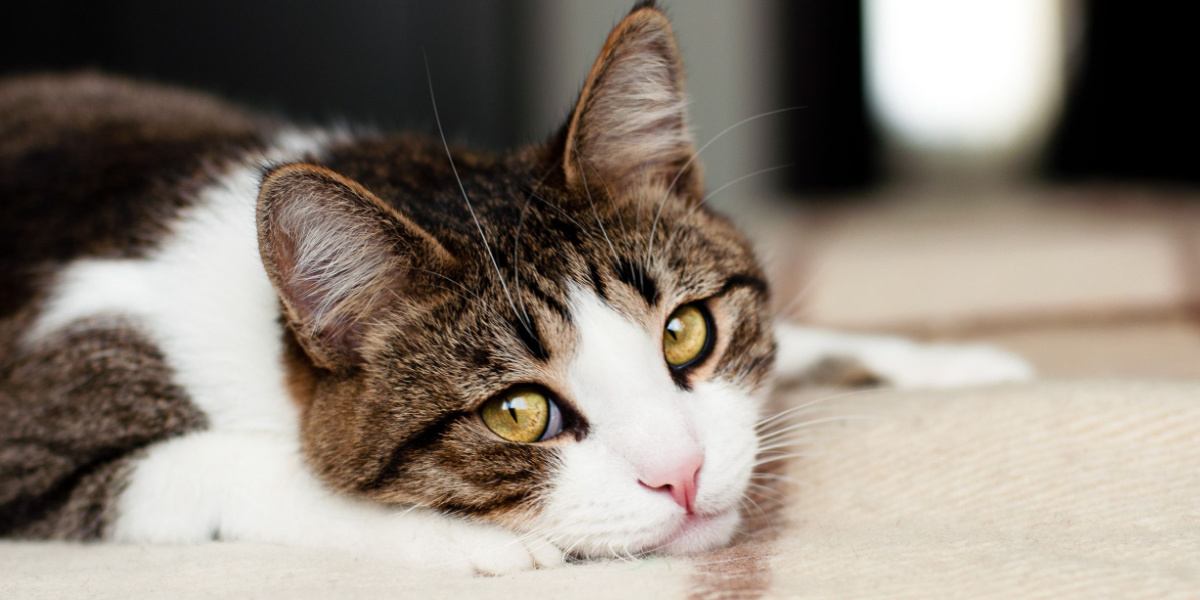
Have you ever had the impression that you’ve hurt your cat’s feelings? Perhaps they hid away after you were late with the cat food, or stalked off huffily when you had to get up mid-cuddle? Cat owners will not be surprised to learn that cats can experience a range of emotions, and have their individual likes and dislikes.
Cats have been shown to experience various human emotions, from joy and curiosity to fear and anger. Cats are sensitive to stress, and might easily have their feelings hurt by small changes to their environment or our interactions with them. Understanding what might upset your cat is vital to preventing stress and maintaining their well-being.Quick Overview
Cats have a reputation for being independent and somewhat aloof, but these sensitive creatures can be easily upset. Read on for some common scenarios in which you might be unintentionally hurting your cat’s feelings.
Do Cats Have Feelings?
It has been well established that animals can have feelings, and experience a range of human emotions. It is difficult to assess very complex emotions in cats, but some important and primary feelings such as fear, anger, joy/play, contentment, and interest have been well established.
Emotions affect cat behavior, and therefore a cat’s well-being, which will in turn have consequences for the owner-pet interaction and harmonious living conditions. We know that cats can experience emotions, so it is therefore not a huge leap to assume that these feelings can be hurt.
What might be more surprising to pet parents is just how these feelings can be hurt—it’s easier than you think to upset a cat!
How You’re Hurting Your Cat’s Feelings
Cats are all individuals and have varying needs, preferences, and pleasures. Getting to know what makes your cat happy and what really ticks them off is essential for maintaining a loving and happy household. Here are some common things that might make a cat sad:
1. Dirty Litter Box
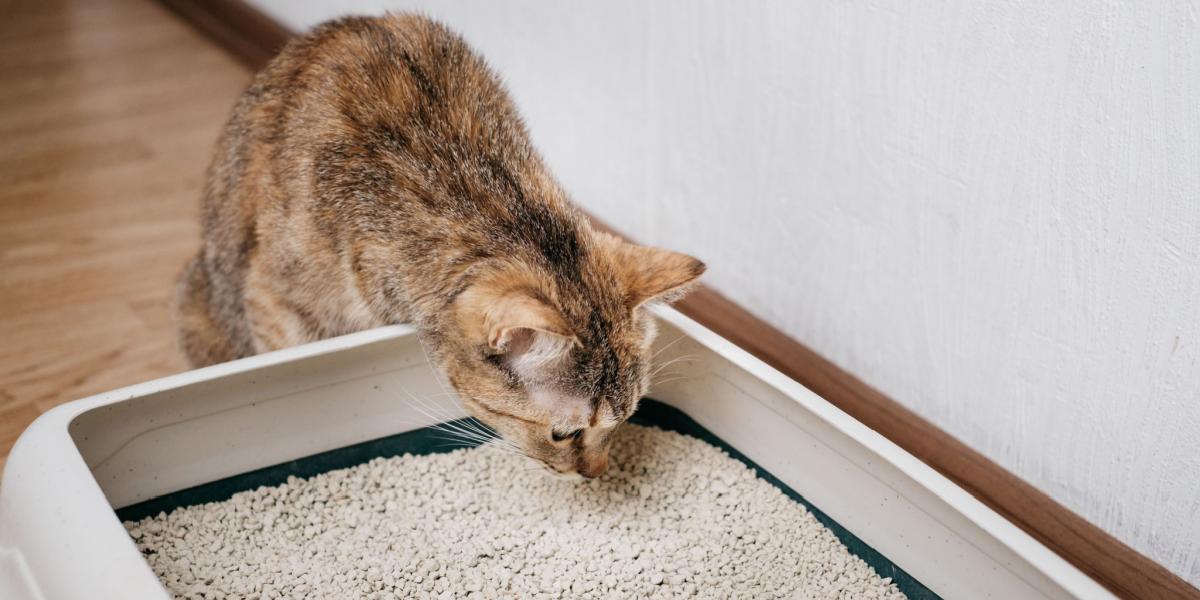
Your cat might feel upset with you if you don’t keep their litter box pristine.
Cleaning out the cat’s litter box is no one’s favorite job, but cats are fastidious creatures. Most feel that toileting in a dirty environment is just not acceptable, and who can blame them? Keeping the litter trays clean and fresh is essential for your cat’s health and well-being.
2. Neglecting the Food Bowl
Cats love their set routines and can become upset and stressed by any change to their usual habits. If you usually always provide fresh food and water for your cat at breakfast time, they might well react badly if you break this rule.
Other bowl-related problems can include a lack of cleaning (a health risk as well as an emotional one!), moving the dishes to different areas, and having the food and water bowls too close together. What a minefield!
3. Loud Noises
Cats have an impressive sense of hearing, but this means they can be very sensitive to loud noises. Shouting, banging, and crashing can all be alarming for your cat, although they are particularly sensitive to high-pitched noises such as loud alarms and screaming.
4. Strong Smells
Along the same lines as loud noises, cats have very sensitive noses. Some smells, such as catnip, may make them wild with joy, but others, such as citrus and eucalyptus, can be extremely repellent to cats. If you have a new soap, perfume, or detergent and notice your cat giving you a wide berth, it may be due to your new scent!
5. Lack of Quality Time
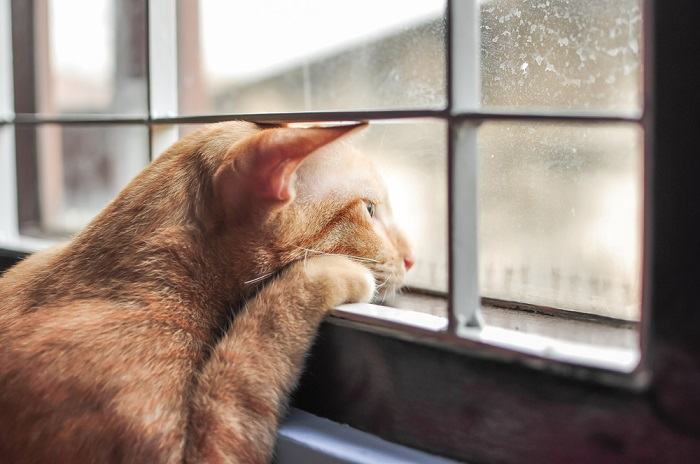
If you have been leaving your cat home alone more than usual, you might be hurting their feelings.
Cats are social creatures. Most domestic cats love interacting with their human family members. This may be through cuddling, grooming, playtime, or just being near us. It’s important to spend time with your cat, forge a strong bond with them, and invest in their happiness and well-being.
It’s also important to leave them alone if they are hiding, snoozing, or eating, or make it clear through their body language and posture that they don’t want to be fussed right now.
6. Boredom
Owning a cat doesn’t just involve providing them with a bed, litter box, food, and water. Responsible cat care also requires providing mental stimulation for these intelligent and active pets. This is especially important if you have an indoor cat that might get bored more easily.
Consider cat toys, perches, scratching posts, and cat trees, as well as plenty of human interaction. Providing stimulation will enhance your cat’s well-being, and might just save your curtains, your furniture, and your sanity.
7. Punishment
Shouting, punishing, or hurting a cat is unacceptable. Physical or mental discomfort doesn’t correct behavior, it only causes fear and stress. If your cat is doing something you dislike, don’t resort to swatting or yelling at them. Instead, try to understand the cause of the behavior and how you can prevent it from occurring again.
How Does a Cat Show Its Feelings Are Hurt?
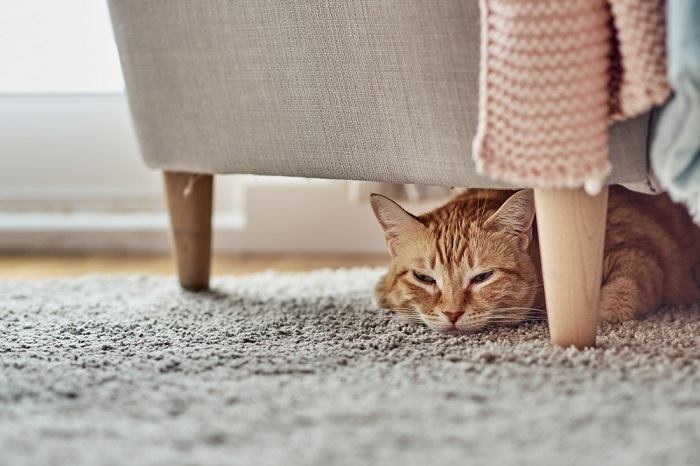
Hiding away can mean a cat has their feelings hurt, but it’s also a sign of illness so it’s best to have your cat checked by a veterinarian just in case.
Cats can’t tell us if they’re upset with us, but they can definitely show us! A cat’s body language, posture, behavior, and habits might change if they are stressed or unhappy about something. You might notice behavioral changes such as hiding away more, inappropriate toileting outside the litter box, vocalizations such as excessive meowing or even hissing, or a change in their interactions with you.
It’s so important to recognize when your cat is upset. Some small upsets cannot always be avoided, but long periods of stress can have a significant health impact on cats. Understanding our pets’ likes and dislikes lets us reduce their stress, improve their well-being, and encourage a happy household.
Also Read: 12 Signs Of An Extremely Happy Cat
Frequently Asked Questions
How do you know if your cat’s feelings are hurt?
Cats might display unhappiness or stress through behavioral changes, such as toileting outside the litter box, vocalizations, hiding away, or changing their interactions with you. They might also show changes to body posture, such as tail position or facial expression.
Can cats be emotionally hurt?
Yes, cats can experience a range of emotions, including fear, stress, and hurt. They are reactive to our own moods and emotions and are sensitive to routine change and other sources of stress.
Do cats get sad if you ignore them?
Cats vary in character, and some enjoy human interaction more than others. Cats are social creatures, however. Most will thrive on attention and become sad, frustrated, and bored if neglected or ignored.
-
Levine, ED. (2008). Feline fear and anxiety. Veterinary Clinics of North America: Small Animal Practice. 8(5):1065–79.
-
Nicholson, S.L., O’Carroll, R.Á. (2021). Development of an ethogram/guide for identifying feline emotions: a new approach to feline interactions and welfare assessment in practice. Irish Veterinary Journal. 74, 8.
-
Panksepp J. (2005). Affective consciousness: Core emotional feelings in animals and humans. Consciousness and Cognition. (14), 30–80.
 Fact checked by
Fact checked by



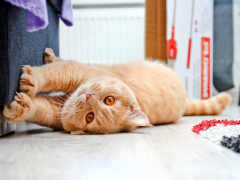

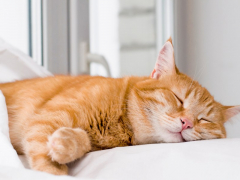
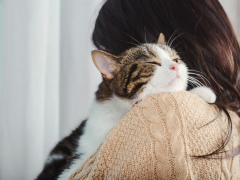
I have 3 cats Moon, Sendo and Daju. I love them all. Daju is the later and I adopted he from wild. First I isolated them in different rooms. Then I let them touch each other slowly to make them know each other. But Daju always pursues Moon and Sendo. 6 months past, they still not accept each. I don’t know what should I do to make them live together. Could you please give me some advice?
I recommend watching Jackson Galaxy’s videos about integrating cats. They are very helpful. It took about 7 months, but I managed to integrate 2 new adult cats with my existing 2 cats by using his strategies. You can find him on YouTube.
The title says “6 Ways You Might be Hurting your Cat’s Feeling”, then under that the heading says “10 Things that Hurt Cats Feelings”. Then it shows 7 ways only. Little confusing.
That is confusing, Jan! Thanks for bringing it to our attention, we’ll get that corrected.